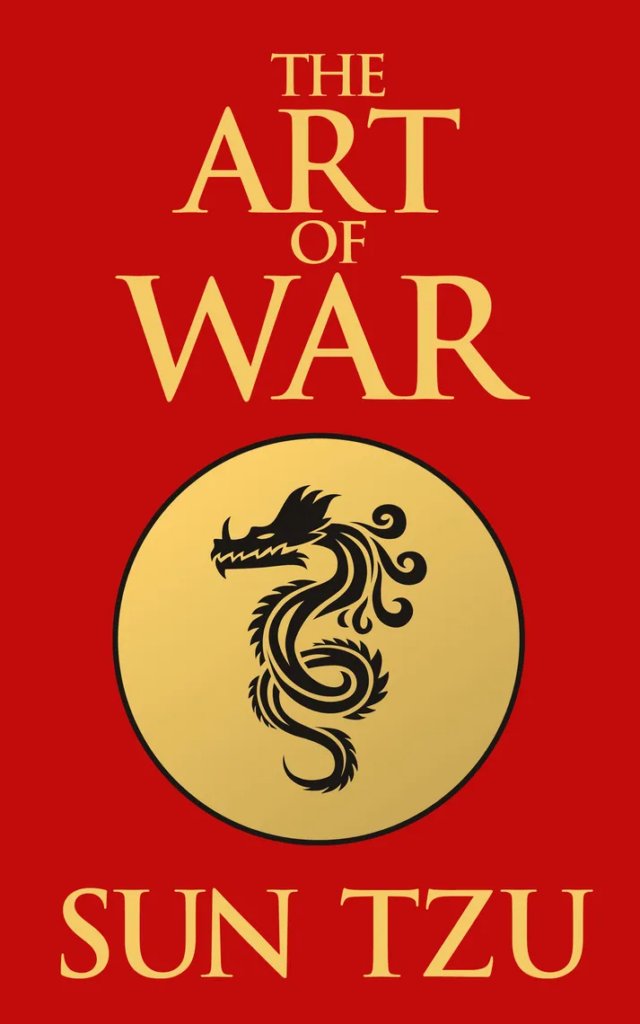“The art of war is of vital importance to the state.”
– Sun Tzu.
A lesson in general wellness…
As an Amazon Affiliate it is policy to inform you that this is an advertisement. However, this is still a reflection of a great book that I’ve read many times over. I believe it would benefit any who may read it. You can find the link for it in my references located at the bottom of this page.
Reading the art of war was an experience. The original text is very short. Less than 70 pages. But somehow, looking at my stack of notes, it’s as high, if not higher than, books that offer 4 times as much material. Recommended reading for anyone who wishes to understand a critical part of life.
If true, long-lasting peace is to be secured, you must be capable of chaos yourself. You shouldn’t expect much from a man who doesn’t know how to defend himself. We have to be capable of darkness if our light means anything to us. Capable of it, and not consumed by it.

(John snow from “Game of thrones” Based off “A song of Ice and Fire” series.)
Why War?
Hopefully, you have been paying attention to what I’ve been saying about blindness. It’s not just so that you can avoid catastrophe. It’s also for properly identifying a threat seeking you out. It’s so you can see your own weaknesses and address them properly before the threat finds you. If you are blind, you are not ready. Your peace will always be in jeopardy.
No one is ever completely safe. People get crazier ideas about what qualifies as a ‘prank’ nowadays. And people are more sensitive now than ever. Not only must you be ready to fight at all times, but you must also be aware when fighting will cost you.
The first thing you need to consider when spotting an enemy is that war is expensive. Let’s talk about war in a literal sense for a second. How much do you think it would cost to keep an army of 100,000 men on the field for just one day? That’s paying each of them for the risk, paying for the resources they would need to fight said war, any unforeseen needs that may arise, and the clean-up job afterward?
a few million dollars at least, and that’s if you’re broke!

(Make a man out of you. A scene from Disney’s “Mulan”)
What War is all about.
The next thing you need to consider is the energy needed to wage war in the first place. The fight may draw out longer than you anticipated, leaving you vulnerable. Only manipulators benefit from a long, drawn-out battle. The point of war is winning. Only winning. Not damage, or revenge, not even gratification. Victory. Victory goes to the one with more resources in the end. And the quicker the end is reached; the quicker peace is restored.
With this in mind, remember that your enemy most likely wants to return to peace as soon as possible as well. The best result of warfare is both sides achieving peace. Your strategies should be defensive in nature. Focus more on foiling the enemy than defeating him. In battle, an individual often defeats himself before the enemy strikes him down. Beware of your own mistakes. Watch for the enemy to make one as well because he will. Capitalize on each one.
Standing over a thoroughly defeated enemy, your first choice, if applicable, should be showing respect to your enemy. Spare him. Power is in what you don’t do. You can get more out of a spared and respected former enemy than you would a crushed one. This is true, long-lasting peace. If you are not blind, if you understand darkness, you do not have to worry about a betrayal.

(Aang sealing Fire-Lord Ozai’s ability to firebend. From “Avatar the Last Airbender”)
The importance of information.
But what about applied darkness? Deception? What if your enemy is also perceptive? This is why we must be capable of this darkness ourselves. All warfare is based on deception. Warfare is a part of life. Therefore, deception is a part of life. You must attain some level of mastery of this skill. A blinded enemy is bound for mistakes you can capitalize upon.
As I said before, sight is a function of the brain to gather information. Information is the key word here. To deceive like a true general, you must know everything there is to know about what’s going on before the war begins. Know the enemy, know yourself, and you don’t have to fear the outcome of 100 battles. You must make your enemy question what they know constantly. Above all else, remain as silent as possible about your ultimate goal. Knowing is half the battle. It goes both ways.
Victory comes from strategy. A successful strategy mandates protocols for any contingency or advantage. These protocols decide the tactics during the flow of battle. You cannot afford blindness in battle. Run if you are not prepared. Retreating isn’t the same as defeat. Always fight on your terms whenever possible. On your time. When you are best equipped. And remember to always save something for the next fight. The Victor in battle is whoever has more at the time of its conclusion.

Don’t waste time.
It takes time to think of strategy. Even more so to consider protocols. And your entire life to develop tactics. It is important to never neglect your readiness. Time will pass whether you use it wisely or not. And there will always be another war. It is part of life. This is why war is important.
Finally, remember that a war is usually never fought for your own sake. No army will follow a selfish general. A war for your lone benefit is a war often not worth fighting. It is nigh impossible to win a war on your own. A general is nothing without an army. Never fight alone. Unify your cause with that of others. Two in harmony will always surpass one in perfection.
Remember to check out “The Art of War.” Study it and apply it to your own lives. You’ll be much more ahead of most of the world who just won’t.
References and Photos.
“The Art of War” – Sun Tzu,
“Game of Thrones” – George R.R. Martin, David Benioff and D. B. Weiss (D&D),
“A song of Ice and Fire” – George R.R. Martin,
“Mulan” – Disney Studios,
“Avatar the last Airbender” – Micheal Dante DiMartino, Bryan Konietzko, Aaron Ehasz.

